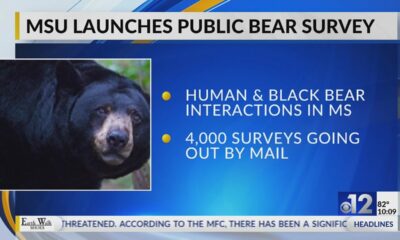Mississippi Today
Independent autupsy next step in death probe of Jackson man

With completion of the state's autopsy of Belhaven Heights resident Dau Mabil, showing death by drowning of unknown cause, his brother can move forward with getting a second independent autopsy he fought to obtain.
Bailey Martin, a spokesperson for the Department of Public Safety, said in an email the autopsy can be conducted without delay, impairment or interference now that Capitol Police's investigation is closed.
“The family is awaiting results of an independent autopsy and they will move forward from there,” said Lisa Ross, a Jackson attorney representing Mabil's brother, Bul.
She said the goal is to have the autopsy completed so that Mabil can have a proper burial.
A May court order set the terms for a second autopsy, including that Dau Mabil's body would be stored by the State Medical Examiner's Office until investigations are complete.
Ross said the names of two forensic pathologists have been shared with Dau Mabil's widow, Karissa Bowley. In court, she asked for guardrails for the independent autopsy, including a requirement that the examiner be qualified.
Bowley was not immediately available for comment Friday.
Dau Mabil, along with his brother, came to Jackson in 2000 as one of the “Lost Boys of Sudan,” boys who had fled war and genocide in their country. Bul Mabil said his brother was born in 1990, but the autopsy report states his age as 37.

Dau Mabil was last seen March 25 in the Belhaven area after going on a walk without his phone, according to his wife. Video footage showed him near Jefferson Street and Fortification and High streets, and Bowley said he went to check on corn he planted near the Museum Trail.
Bowley and community members began search efforts. Bul Mabil traveled from out of state and joined Bowley and others at an early April press conference to call for answers about Dau's whereabouts.
Three weeks later, a fisherman reported a body floating in the Pearl River near Lawrence County, and a preliminary autopsy revealed that it was the body of Mabil. The Lawrence County sheriff said there was no evidence of foul play.
Bul Mabil and other family members have questioned if that is true. The day his brother's body was recovered, he sought an emergency restraining order against Bowley, Capitol Police and the state Crime Lab to preserve Dau's body for a state autopsy and an independent one.
Several weeks later in May, Hinds County Chancery Judge Dewayne Thomas removed Bul Mabil from the lawsuit, but Bowley said in court and in filings that she would allow a second autopsy. In his order, Thomas stipulated that a second autopsy would be done at Bul Mabil's “direction and expense.”
Last week, Bowley released the state's five-page autopsy report that listed Mabil's cause of death as drowning and the manner of death as undetermined. The report notes that there were no internal or external signs of trauma or injury that could account for his death.
Postmortem toxicology analysis of liver tissue and decomposition fluid found the presence of ethanol.
An accompanying toxicology report noted that ethanol – also known as ethyl alcohol or drinking alcohol – can be a central nervous system depressant that can cause impaired judgment, reduced alertness and impaired coordination. Ethanol also can be a product of decomposition, the report notes.
A week before the autopsy results were released, the Bowley family and Mabil family and supporters spoke in separate press conferences.
The Bowleys dismissed allegations and implications that his widow or family had anything to do with Mabil's disappearance, which Ross had implied during her questioning of Karissa Bowley during an April court hearing on the restraining order.
Bul Mabil was joined by his and Dau's mother, who had traveled from Africa, along with Sudanese family, friends and community members. Bul Mabil still believes someone killed his brother, and he criticsized Capitol Police for how it handled his case, local media reported.
This article first appeared on Mississippi Today and is republished here under a Creative Commons license.
Mississippi Today
Mississippi judge blocks Biden attempt to ensure LGBTQ+ medical treatment
A federal judge in Mississippi has blocked enactment of a Biden administration rule designed to prevent medical care from being denied to those seeking treatment related to gender identity or sexual orientation.
The lawsuit U.S. Southern District Judge Louis Guirola Jr. ruled on Wednesday was filed by 15 states, including Mississippi. But he said his injunction preventing the Biden administration from enforcing its rule would apply nationwide. His ruling is likely to be appealed.
On social media, the Human Rights Campaign proclaimed, “This is not over. All LGBTQ+ people should receive the health care we deserve and be able to make informed decisions about our own bodies.”
The Biden administration rule enacted earlier this year is designed to ensure those seeking medical care on the basis of gender identity or sexual orientation are not subject to discrimination. The rule is supposed to cover entities receiving federal funds for the delivery of health care.
The states argued against being forced to provide gender-affirming care through Medicaid programs or through health plans for state employees. In addition, the states argued against private insurance companies being required to provide such care.
“Injecting gender identity into our state's medical system is a dangerous pursuit of a political agenda from the Biden Administration,” Mississippi Attorney Lynn Fitch said in a statement. “Medical professionals should not be forced to provide gender transition surgeries or drugs against their judgment and hospitals should not be prohibited from providing women-only spaces for patients. I am proud to lead the multistate effort with Tennessee Attorney General Jonathan Skrmetti to stop the Biden Administration and push back on this reckless rule.”
The lawsuit is one of many filed by attorneys general and others objecting to the Biden administration interpreting Title IX to apply to banning discrimination based on sexual orientation and sexual identity. Congress passed, and President Richard Nixon signed into law, Title IX in 1972 to ban sexual discrimination.
In response to one of the similar lawsuits ruled on earlier in Louisiana, Kelley Robinson, president of the Human Rights Campaign, said, “Every student … deserves to be safe. Every young person deserves protection from bullying, misgendering and abuse.”
Robinson added, referring to the earlier court ruling, “This is MAGA theatrics with the dangerous goal of weaving discrimination into state law.”
Mississippi has passed a state law prohibiting minors from receiving gender-affirming care even if it is recommended by physicians.
On social media, Gov. Tate Reeves said, “The Biden Administration attempted to undermine Title IX by dramatically reinterpreting its meaning to now apply to gender identity. Thankfully, a federal court judge has sided with Mississippi and other states who chose to stand up for women and defend Title IX as it currently exists.”
The lawsuit filed by Fitch and other attorneys general argued that their states could be penalized by the loss of federal Medicaid funds, for example, if they did not adhere to the rule.
In blocking the rule. Guirola cited the Chevron case where the U.S. Supreme Court recently said that federal agencies should not be given deference in their rules-making.
This article first appeared on Mississippi Today and is republished here under a Creative Commons license.
Mississippi Today
State GOP plans to endorse judicial candidates, while Democratic Party does not

The leaders of the Mississippi's two major political parties recently offered two opposing plans for how much they plan to interact with candidates competing for one the state's three contested races for the state Court of Appeals and the state Supreme Court.
Mississippi Republican Party Chairman Mike Hurst told Mississippi Today on the June 24 edition of Mississippi Today's “The Other Side” podcast that the GOP will likely endorse certain candidates in the race, while Mississippi Democratic Party Chairman Cheikh Taylor said on the July 1 episode of the podcast that judicial endorsements are not on the party's radar.
Judicial elections tend to be low-interest races, but the elections this year will take place on the same ballot as the presidential and congressional elections. If a major political party endorses a candidate, it could give them more name recognition at the ballot box.
“I know it's a nonpartisan race, and I think there should be a clear dividing line between the campaigns for nonpartisan races and the partisan entities like the Republican Party,” Hurst said. “But at the same time, we all know that there are differences that judicial candidates hold in their opinions on how to interpret the constitution and how to interpret statutes.”
Candidates for the Mississippi Court of Appeals and the Mississippi Supreme Court are required to run as nonpartisan, meaning they do not run in a party primary. However, political parties can still endorse candidates running for those offices.
For a few years, state law banned parties from endorsing or donating money to nonpartisan judicial candidates. But the state GOP in 2002 filed a federal lawsuit challenging the ban. U.S. District Judge Henry T. Wingate struck down the ban as unconstitutional, saying it was a violation of the U.S. Constitution's First Amendment.
Taylor, who just won election to a full term as Democratic Party chairman, said the party is still in a “rebuilding phase” and has to carefully decide which races it should get involved with.
“There are so many races to get involved in and so many ways that funding is limited,” Taylor said. “We are structuring now to broaden our base to make sure that fundraising is not an issue moving forward.”
There are three contested judicial races this year: an open seat on the Mississippi Court of Appeals and two Mississippi Supreme Court races where incumbents face challengers.
In the Central District race for the Supreme Court, longtime incumbent Justice Jim Kitchens, a senior member of the Court, faces a challenge from four candidates: Abby Robinson, Ceola James, Byron Carter and Jenifer Branning. In the Southern District race, incumbent Justice Dawn Beam faces a challenge from David Sullivan.
Three people are competing for an open Court of Appeals seat: Jennifer Schloegel, Amy Lassiter St. Pe and Ian Baker.
All candidates will appear on the Nov. 5 general election ballot. If a candidate does not receive a majority of the votes cast, the two candidates who received the most votes will advance to a runoff election on Nov. 26.
This article first appeared on Mississippi Today and is republished here under a Creative Commons license.
Mississippi Today
Federal judges order Mississippi Legislature to create more Black districts, may prompt 2024 elections
The Mississippi Legislature has been ordered to create more Black-majority House and Senate Districts by a federal three-judge panel.
“The court rightly held that the Mississippi Legislature used the redistricting process to dilute the power of Black voters. Those legislative districts denied Black Mississippians an equal voice in state government,” said Jarvis Dortch, executive director of the ACLU of Mississippi.
The judges ruled in a lawsuit filed on behalf of the Mississippi Conference of the NAACP and Black voters from across the state that the districts that were drawn in 2022 by the state Legislature diluted Black voting strength. Legislative redistricting occurs every 10 yeas after the federal census.
In the ruling, released late Tuesday, the federal panel said it would give the Legislature the opportunity to redraw the districts, but added, “It is the desire of this court to have new legislators elected before the 2025 legislative session convenes, but the parties can make whatever arguments about timing they conclude are valid.”
The state, which opposed the lawsuit, can argue for more time to redraw the districts. Or the state could appeal the ruling to the U.S. Supreme Court.
MaryAsa Lee, a spokesperson for Republican Attorney General Lynn Fitch's office, said the agency is currently reviewing the court's opinion. She did not say whether Fitch wanted to appeal the order.
The federal panel did not accept all of the arguments of the NAACP and other plaintiffs. But the panel ruled that Black-majority Senate districts should be drawn at least in the DeSoto County area in north Mississippi and in the Hattiesburg area in south Mississippi. In addition, a new Black majority House district should be drawn in the Chickasaw County area in northeast Mississippi.
The state has a Black population of about 38%. Currently there are 42-Black majority districts in the 122-member House and 15 Black majority districts in the 52-seat Senate.
Multiple groups represented the NAACP and other plaintiffs in the case.
The three judges serving on the panel were all appointed by Republican President George W. Bush.
Charles Taylor, executive director of the Mississippi State Conference of the NAACP, said he was pleased with the decision “although we wish the court had gone further.”
The NAACP and others argued the totality of the 2022 redistricting by the Legislature diluted Black voting strength. Groups argued by “packing” a large percentage of Black voters in a concentrated number of districts it deprived them from having an impact in other districts. The three judge panel did not accept the total argument of the plaintiffs.
But still, the people who brought the lawsuit maintained the decision of the federal panel was a victory for Black Mississippians.
“This ruling brings us much closer to the goal of ensuring that Mississippi has a fair number of majority-Black legislative districts to go along with the majority-white ones,” said Rob McDuff, an attorney with the Mississippi Center for Justice.
READ MORE: Lawsuit claiming Mississippi Supreme Court districts are discriminatory is set for August
The Lawyers' Committee for Civil Rights Under Law, the American Civil Liberties Union, ACLU of Mississippi, the law firm of Morgan, Lewis & Bockius, Mississippi Center for Justice and civil rights attorney Carroll Rhodes all participated in the case.
“This ruling affirms that the voices of Black Mississippians matter and should be reflected in the state Legislature,” said Jennifer Nwachukwu, of the Lawyers' Committee for Civil Rights Under Law Voting Rights Project.
The next step will be for either the state to appeal or present arguments to the federal panel on why the new districts should not be drawn and filled via election before the 2025 legislative session.
This article first appeared on Mississippi Today and is republished here under a Creative Commons license.
-
Mississippi News6 days ago
Pearl under boil water notice due to E. coli
-
Mississippi News7 days ago
Tropical wave has a 70 percent chance of developing, National Hurricane Center says
-
Mississippi Business7 days ago
Communities qualify for Welcome Home Mississippi recertification
-
Our Mississippi Home7 days ago
Mississippi State’s UTC Staff Win Seven Emmy Awards
-
SuperTalk FM6 days ago
Move over 662, a new area code is coming to north Mississippi
-
Our Mississippi Home7 days ago
Celebrating the 15th Season of Festival South
-
Kaiser Health News7 days ago
Supreme Court Upends Purdue Pharma Opioid Settlement
-
Mississippi News6 days ago
Youth Court Judge says there is a dire need for foster homes – Home – WCBI TV



































